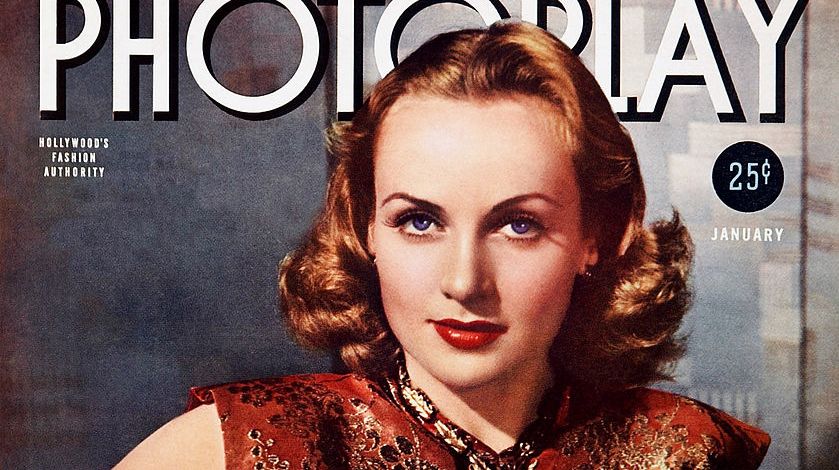
Celebrities fade in and out of fashion, and so do the magazines that cover them. Enjoy these 11 retro celebrity magazines, which covered the movie, music, radio, and television stars of their day.
1. Confidential // 1952–1978
Confidential was one of the first magazines to feature lurid gossip, exposés, and celebrity scandals. In 1954, the magazine’s scoop on the breakup of Marilyn Monroe and Joe DiMaggio’s marriage gave a boost to its circulation. Publisher Robert Harrison would later boast of a readership of over 4 million.
As the scandal rag grew in popularity, celebrities and film studios became increasingly worried by the damaging coverage it generated. In 1957, California attorney Jerry Giesler decided to sue, vowing, “The smut is going to stop.” Libel cases started flowing. Celebrity witnesses including Mae West and Liberace testified in front of a grand jury against the magazine, but the jury could not agree and it was ruled a mistrial. The cases had caused too much heat for Harrison, however, and he eventually switched the focus of the magazine away from celebrity gossip, resulting in a fatal decline in readership.
2. Motion Picture Magazine // 1911–1977
Motion Picture Magazine is considered the first movie fan magazine. It ran short adaptations of recent popular movies and included “behind the scenes” photo spreads from movie sets. Motion Picture Magazine also debuted a column called “The Answer Man”—written by a woman—that responded to readers’ questions about the movie business.
3. Photoplay // 1911–1980
Photoplay, established in 1911, reached its peak of popularity in the 1920s and ‘30s. The magazine focused on the movie industry, working closely with the big studios to cover all their major stars. Photoplay outsold its rivals because it not only included the sycophantic stories provided by the studios, but it also featured its own editorial voice—which they claimed represented movie fans.
The magazine was so popular that, in 1921, it introduced one of the first major annual movie awards: the Photoplay Magazine Medal of Honor. The Producer of the Year’s best film was given a medallion designed by Tiffany & Co., and winners included All Quiet on the Western Front (1930), Little Women (1933), and Gone with the Wind (1939). The popularity of the magazine declined as the Golden Era of Hollywood waned, and Photoplay published its final issue in 1980.
4. On the Q.T. // 1955–1964
On the Q.T. (an abbreviation of “on the quiet,” meaning a secret) ran with the tagline, “The CLASS magazine in its field.” Yet this bimonthly publication largely focused on spreading salacious celebrity gossip. Mid-century headlines that caught readers’ eyeballs included “The Secret Disease That Killed Monroe,” “What’s With ‘Call Me Mr.’ Sinatra?” and “Those Jayne Mansfield Unfit Mother Charges.”
5. Modern Screen Magazine //1930–1985
Lana Turner was shown reading a copy of Modern Screen Magazine in the 1933 movie Dinner at Eight. The pub was founded in 1930 and, with its mix of celebrity interviews and pictorials, it quickly became one of the most popular movie periodicals in America. It later expanded its scope to include music and television stars. But by the 1980s, general interest celebrity magazines, such as Us Weekly, dominated the market. Niche movie magazines like Modern Screen lost their readership.
6. Broadway Brevities and Society Gossip // 1916–1925 (revived 1930–1933)
Known better as Broadway Brevities, this magazine is generally considered America’s first weekly tabloid. Initially it covered society and theater gossip, but it later expanded to include scandals. Its publisher, Stephen G. Clow, was actually indicted for “using the mails to defraud” the public, according to media scholar Will Straw, because he operated Broadway Brevities as a blackmail racket [PDF]. Clow was accused of threatening to publish injurious stories about businesses or individuals if they didn’t purchase advertising in the magazine. He and two associates were convicted.
7. Laff // 1940s and ‘50s
Billed as “The Humorous Picture Magazine,” mid-century Laff featured photo spreads of celebrities. Especially notable was the January 1946 edition, which featured an early photo of up-and-coming Marilyn Monroe in a bikini captioned as “Norma Jean Daugherty.”
8. Picture Play // 1915–1941
Originally a weekly movie periodical, Picture Play is best remembered for its beautifully illustrated movie star covers, which showed icons like Carole Lombard, Norma Shearer, and Marlene Dietrich in dramatic poses. Later, cover photography put Vivien Leigh and Joan Bennett in their best light. But between the covers, the magazine was mostly concerned with rehashing the plots of the latest movies and writing fawning articles about the stars. Gossip was avoided in favor of studio-sanctioned news, ensuring any hint of scandal was glossed over.
9. TV-Radio Mirror // 1933–1977
TV-Radio Mirror was a monthly magazine that covered radio, movie, and TV stars. It included interviews, behind-the-scenes pictures, and “at home with the stars” features. The magazine also ran stories supposedly authored by the stars themselves, offering insight into their glamorous lives.
10. Teen Beat // 1967–2007
Teen Beat, which rose to become a pop culture institution in the 1980s and 1990s, was aimed at 12-to-16-year-old girls. It produced tons of full-color posters of the hottest teen idols, which could be ripped out of the magazine and plastered all over suburban bedrooms. Cover stars included New Kids on the Block, Tom Cruise, Mollie Ringwald, and the two Coreys.
11. Picturegoer // 1911–1960
Picturegoer was one of the most popular British movie fan magazines. Unlike modern entertainment mags in the UK, which are generally aimed at men, Picturegoer was written for women. It covered all the latest film releases plus interviews and pictures with the most popular movie stars of the day, like Clark Gable, Bette Davis, and bad boy Richard Burton.
from WordPress https://ift.tt/3eEgZpf
via IFTTT






No comments:
Post a Comment